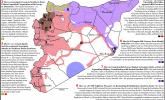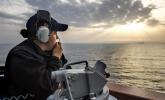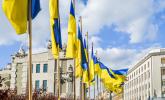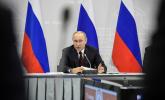ISIS Resurgence Update
April 19, 2019 - Brandon Wallace
ISIS lost its territorial control in Syria and Iraq in March 2019. Now its resurgent campaign is taking form and gaining momentum in key areas. Read the latest assessment and view the new map.

ISIS lost its territorial control in Syria and Iraq in March 2019. Now its resurgent campaign is taking form and gaining momentum in key areas. Read the latest assessment and view the new map.

ISW Research Director Jennifer Cafarella recently spoke at a panel on the future of the war in Syria hosted by the European Union Delegation to the U.S. Read excerpts of her remarks and watch the video of the conversation.

The Kremlin is reinforcing the Maduro regime to protect Russian investments in Venezuela and confront the U.S. in the Western Hemisphere. Read the latest Russia in Review to learn more.

Turkish President Recep Tayyip Erdogan suffered painful losses in key urban centers including Ankara and Istanbul during the 2019 Turkish Local Elections. What are the implications of those losses for Turkey's future and Erdogan's rule?

Russia is expanding its economic and military hold over the Arctic in order to preposition for its long-term bid to secure resources, expand its defense posture, and gain strategic advantage over the U.S. and China.

The latest ISW & Syria Direct map highlights developments in the war in Syria, including Russian airstrikes in Idlib, anti-Assad regime protests in Southern Syria, and ISIS's targeting of a military convoy in Northern Syria.

Turkey’s deepening cooperation with Russia, including naval coordination in the Black Sea and joint military patrols, undermines NATO's cohesion and jeopardizes the prospects for a U.S.-Turkey deal to stabilize Eastern Syria.

The Kremlin is tightening its domestic control over the information space inside Russia while refining the campaign targeting neighboring Ukraine ahead of the Ukrainian Presidential Election on March 31, 2019.

Read the latest updates on the presidential election in Ukraine and how it is shaping the future of a key NATO partner.

Russian President Vladimir Putin has consistently sought a set of objectives since his rise to power in 2000: the preservation of his regime, the end of American hegemony, and the reinstatement of Russia as a global power. The West must understand Putin's worldview if it wants to avoid strategic surprise.